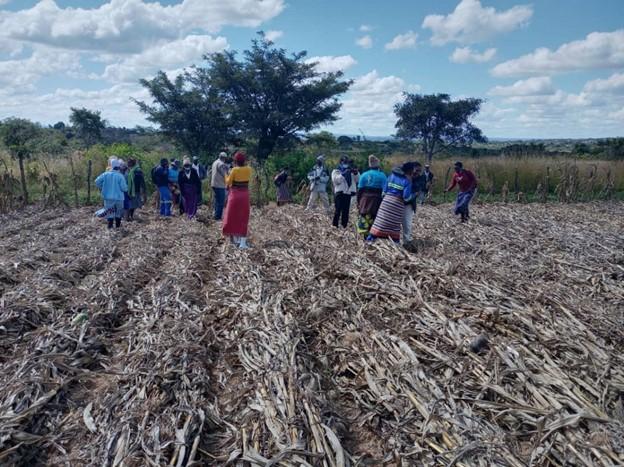Scaling Up Resilience Project increases food security with community-led solutions.

In Zimbabwe, as severe drought and food shortages take a toll, the Zimbabwe Council of Churches (ZCC) is leading efforts to support communities through these challenges. In partnership with The United Church of Canada and the Canadian Foodgrains Bank (CFGB), ZCC’s Scaling Up Resilience Project is providing practical long-term solutions. Focusing on climate-smart farming, gender equality, and community-driven initiatives, ZCC is helping families strengthen their resilience and build a more secure future.
Zimbabwe faces many hardships, from frequent droughts, unpredictable rains, tropical cyclones, economic instability, and disease outbreaks, including cholera. Many people are facing severe food insecurity—including in the Bikita and Gutu districts, where about 43% and 60% of people, respectively, are affected. The pressure of scarcity doesn’t just affect the dinner table—gender-based violence is on the rise, and many families can no longer afford to send their children to school.
In the face of these challenges, the Scaling Up Resilience Program will reach 1,376 households—or about 6,880 people—with practical training that addresses some of the challenges:
- Training for a stronger future: Participants will receive training in gender-sensitive, climate-smart agriculture by using a lead farmer model, where farmers learn from one another. Elderly people, those with disabilities, and youth will be included to ensure they have equal access to support and opportunities.
- Disaster risk management (DRM): Communities are becoming more resilient by strengthening their early warning systems for natural disasters. With local governments trained in DRM, knowledge is getting to the villages, better preparing them for the unexpected.
- Reviving community assets: Repairing and creating essential infrastructure—like community weir dams, soil and water conservation works, and irrigation schemes—will allow families to grow more food and conserve water.
- Promoting gender equality: Women farmers will be supported to become leaders in their communities. Men will also be leaders, fostering a shared commitment to gender equality and positive community change.
- Building financial resilience: The program will help households set up and expand savings and loans programs so they can invest in their family, farms, and businesses, leading to greater stability and growth.
We are deeply grateful for another opportunity to partner with The United Church of Canada and CFGB in this new project…that addresses all the three capacities that are necessary for communities to achieve resilience in the face of shocks and stresses. Although we will be working directly with only but a few farmers, we are anticipating that the impact of this project will be felt throughout all communities in the two districts, spill over to other surrounding areas and beyond.
—Zimbabwe Council of Churches
Want to Get Involved?
- Apply to join a Canadian Foodgrains Bank Learning Tour.
- Advocate: Spread the word about the importance of food security, sustainable development, and gender equality. Join CFGB for Hunger on the Hill to meet with MPs and advocate for more international aid to end global hunger.
Learn More about the Work of Global Partnership
At the core of this initiative is a partnership of deep mutual radical accompaniment and solidarity. The United Church of Canada’s Global Partnership Team and the Zimbabwe Council of Churches are coming together in equal partnership with a shared vision.
Would you like to accompany the Global Partnership Team on our journey of daring justice, bold ideas, and deep radical accompaniment? Follow the United Action for Justice pages on Facebook, Twitter/X, and Instagram.
If you’d like to hear more about global partnership work at community of faith events, services, and gatherings, let us know! Contact the Global Partnership Team at .